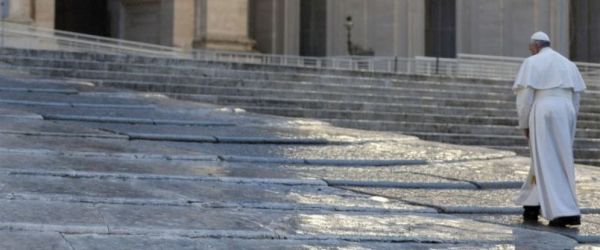The Gospel tells us about the events preceding the birth of Jesus, and the Evangelist Matthew presents them from the point of view of St Joseph, the betrothed of the Virgin Mary.
Joseph and Mary were dwelling in Nazareth; they were not yet living together, because they were not yet married. In the meantime, Mary, after having welcomed the Angel’s announcement, came to be with child by the power of the Holy Spirit. When Joseph realized this, he was bewildered. The Gospel does not explain what his thoughts were, but it does tell us the essential: he seeks to do the will of God and is ready for the most radical renunciation. Rather than defending himself and asserting his rights, Joseph chooses what for him is an enormous sacrifice. And the Gospel tells us: “Joseph, being a just man and unwilling to put her to shame, resolved to send her away quietly” (1:19).
This brief sentence reveals a true inner drama if we think about the love that Joseph had for Mary! But even in these circumstances, Joseph intends to do the will of God and decides, surely with great sorrow, to send Mary away quietly. We need to meditate on these words in order to understand the great trial that Joseph had to endure in the days preceding Jesus’ birth. It was a trial similar to the sacrifice of Abraham, when God asked him for his son Isaac (cf. Gen 22): to give up what was most precious, the person most beloved.
But as in the case of Abraham, the Lord intervenes: he found the faith he was looking for and he opens up a different path, a path of love and of happiness. “Joseph,” he says, “do not fear to take Mary your wife, for that which is conceived in her is of the Holy Spirit” (Mt 1:20).
This Gospel passage reveals to us the greatness of St Joseph’s heart and soul. He was following a good plan for his life, but God was reserving another plan for him, a greater mission. Joseph was a man who always listened to the voice of God, he was deeply sensitive to his secret will, he was a man attentive to the messages that came to him from the depths of his heart and from on high. He did not persist in following his own plan for his life, he did not allow bitterness to poison his soul; rather, he was ready to make himself available to the news that, in a such a bewildering way, was being presented to him. And thus, he was a good man. He did not hate, and he did not allow bitterness to poison his soul. Yet how many times does hatred, or even dislike and bitterness poison our souls! And this is harmful. Never allow it: he is an example of this. And Joseph thereby became even freer and greater. By accepting himself according to God’s design, Joseph fully finds himself, beyond himself. His freedom to renounce even what is his, the possession of his very life, and his full interior availability to the will of God challenge us and show us the way.
Let us make ourselves ready to celebrate Christmas by contemplating Mary and Joseph: Mary, the woman full of grace who had the courage to entrust herself totally to the Word of God; Joseph, the faithful and just man who chose to believe the Lord rather than listen to the voices of doubt and human pride. With them, let us walk together toward Bethlehem.
[Pope Francis, Angelus 22 December 2013]












